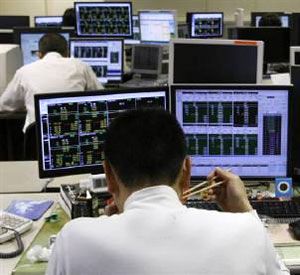 '2012 was dominated by block trades and 2013 focused on government divestments, which are mainly secondary exits.'
'2012 was dominated by block trades and 2013 focused on government divestments, which are mainly secondary exits.'
'Currently, we anticipate a focus back to IPOs and on secondary exits.'
The first half of this year has been good for the Initial Public Offer market and the momentum will continue for rest of the year, says Sanjay Sharma, below, left, managing director & head, equity capital market, Deutsche Bank Group India.
Financials, consumer goods and info technology will dominate this market soon, he tells Samie Modak.
Excerpts:
Do you expect the strong IPO momentum to continue? What are the estimates for fund raising in the rest of the year?
We expect IPOs in the second half to raise equivalent if not more funds than the first half.
If you look at the IPOs where filing has been done or approval received, the amount is about $3 billion, including a few big ones like ICICI Prudential Life and L&T Technology.
Depending on how many of these get executed, we expect this year to raise the highest amount from IPOs since 2010. The second half is likely to see a few large IPOs as well.
Most of the recent IPOs have been secondary exits. Is India Inc not looking at fresh investments, capex, yet?
The capital expenditure cycle is dependent on market dynamics like demand outlook, commodity prices and availability of opportunities.
Whereas the fundraising cycle is dependent on valuations, currently fair.
The capex cycle and fundraising cycle do not run in sync.
A lot of the previous round of capex was funded through debt, as the equity markets were not conducive.
Then, companies raised equity to align their capital structure, which has resulted in less than 50 per cent of the $3.7 bn raised through IPOs since 2014 in the form of primary equity raise and the balance in the form of secondary offers for sale by private equity investors.
There will be a requirement for fresh funds as growth picks up.
What are the exciting themes in the IPO market? Are bankers vying for trophy mandates like NSE or insurance companies?
We are seeing new sectors like insurance and stock exchanges tapping the IPO market.
Banks would obviously be vying for key and prestigious IPOs, the way we have.
A mandate here bodes well for banks to win future mandates as well.
Do you expect any particular sector to dominate the IPO market?
Since 2014, infrastructure and industrials (36 per cent), consumer goods (14 per cent), health care (18 per cent), financials (13 per cent) and TMT (IT, media, telecom; 12 per cent) have been favoured. We are seeing a trend of diversification within the sectors.
The financials space, so far only banks and non-bank financial firms, now see insurance players, micro finance or niche banking players.
Even in health care, we have seen diversification from pure pharmaceutical companies to specialised hospitals and pathology labs. Based on the current pipeline we expect financials, consumer goods and IT to dominate IPO markets in the near future.
How’s secondary market volatility impacting the IPO market?
The IPO window has been more or less open since the new government in 2014, with issues of decent size being debuted every quarter.
Issuers have not been shy to tap the equity markets in even periods of high volatility.
Unlike in the past, where investors were reluctant to invest in volatile markets, investors are now comfortable with the macro story in India and are willing to invest in interesting stories even in difficult times, subject to some valuation buffer.
Recent IPOs have made good returns for investors. Are bankers and companies pricing the issues moderately, leaving gains on the table?
As a result of the increase in market valuations over their long-term average, as well as scarcity of IPOs in recent years, issuers prefer execution certainty over price.
The fact that few equity or debt offerings got successfully priced on or immediately after the Brexit vote suggests investors are willing to participate in deals even in the most volatile market, provided there is sufficient buffer in the valuation to overcome any short-term volatility.
Investors have made money on IPOs, which also helps in generating a ‘feel good’ factor for future deals.
What are the trends in other forms of fund raising such as QIPs, rights issue?
If you look at the past few years, 2012 was dominated by block trades and 2013 focused on government divestments, which are mainly secondary exits.
In 2014 and 2015, qualified institutional placements and depository receipts were popular, in addition to select large block trades and jumbo government disinvestment such as in Coal India and Indian Oil.
Currently, we anticipate a focus back to IPOs and on secondary exits, especially with government starting the process of sale of SUUTI holdings.
The image is used for representational purpose only. Photograph: Reuters












 © 2025
© 2025